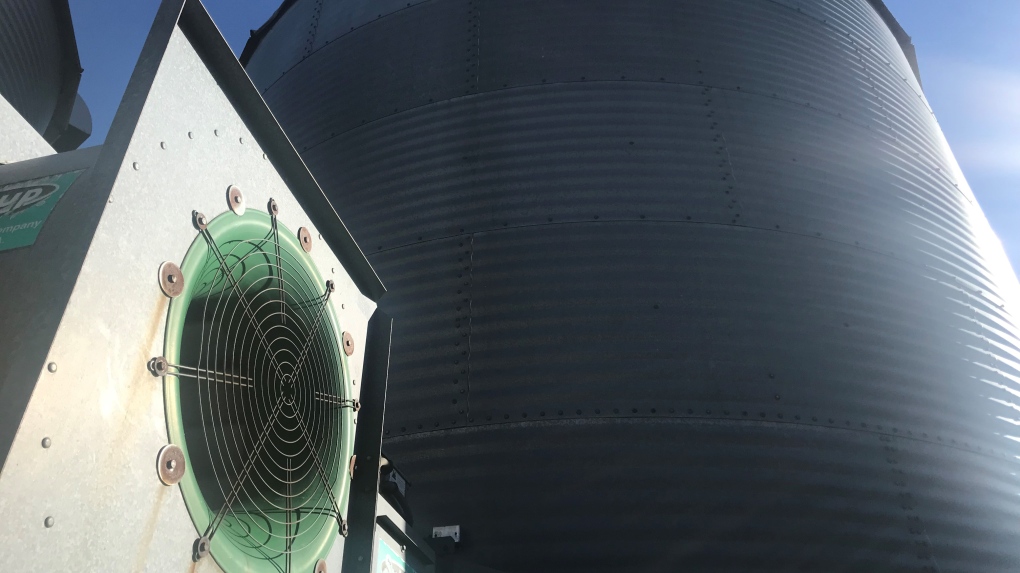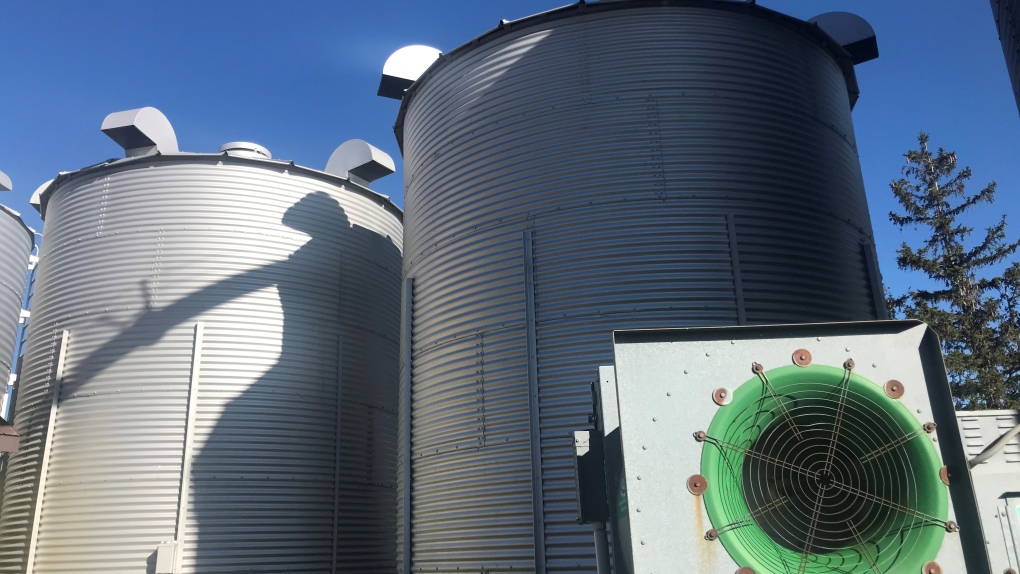'They’re playing politics': Essex County farmers disappointed with Canadian Senate
 A large fan is used to dry corn in a storage bin in Essex County on Monday, Nov. 14, 2023. (Michelle Maluske/CTV NewsWindsor)
A large fan is used to dry corn in a storage bin in Essex County on Monday, Nov. 14, 2023. (Michelle Maluske/CTV NewsWindsor)
Farmers and agriculture associations were hopeful Bill C-234 would be passed, offering relief from carbon tax.
“By the time they decide to do something harvest will be done it'll be too late. And I'm sure that's what their strategy is,” said grain farmer Leo Guilbeault who will pay $12,000 this year in carbon tax.
Two roads over, farmer Moe Chauvin estimates his is around $3,000 a year, “which is a significant amount of money to blow away in the wind,” he told CTV News Monday. “We can't add that price when we sell our grain. That (money) comes out of our pockets and there's no way to recoup that cost.”
So they – and countless farmers like them in Canada – were hopeful with the introduction of Bill C-234.
It would exempt farmers from paying the carbon tax on natural gas or propane used for agriculture purposes.
According to the Canadian taxpayers federation, the federal government previously provided an exemption to farmers for carbon taxes on diesel and gasoline but did not provide an exemption for the fuels used to heat barns and dry grains. A large fan is used to dry corn in a storage bin in Essex County. (Michelle Maluske/CTV News Windsor)
A large fan is used to dry corn in a storage bin in Essex County. (Michelle Maluske/CTV News Windsor)
Drying grain is a critical part of their operations, according to both Chauvin and Guilbeault, particularly for their corn crop.
“The actual kernel itself is 21 per cent water in it. We have to dry it down to 15.5 per cent,” explains Guilbeault.
If the corn was shipped and stored without drying “it would end up moldy” said Guilbeault. the actual kernel itself is 20 has 21% water in it. We have to dry it down to 15.5%.
“A lot of this corn gets stored and it'll get shipped next summer or we can keep it until next falls’ harvest,” said Guilbeault. “The ethanol plant needs regular shipments all the way through the year. Hiram Walker needs regular shipment all the way through the year.”
The cost to dry that grain will continue to go up because of carbon taxes and is expected to soar above one billion dollars for Canadian farmers by 2030, according to the Parliamentary Budget Officer.
Enter Bill C-234, a private members bill that the House of Commons has already voted in favour of.
It returned to the Senate on Nov. 9, but was amended by independent senator Lucie Moncion and then the matter was not debated but rather Senate adjourned discussion and vote until later this month.
Conservative senators were not pleased with the development, calling it ‘outrageous’ and ‘unfair’.
“I can see why they'd be upset about this procedural delay,” said political analyst Lydia Miljan. “They see this as really a betrayal of the independence of the so-called independent liberals.”
Miljan said Prime Minister Justin Trudeau campaigned on Senate reform and made all Senators independents.
“But it's an independent liberal who did this,” said Miljan. “And so now it kind of begs the question, how independent are they because if the government doesn't want this to go through, why would an independent, you know, forward some kind of procedural issue to delay things?”
The Senate is now scheduled to consider Bill C-234 at their next sitting on Nov. 22.
Even if they vote in favour of the exemption, the bill must go back to the house of commons for final approval.
Essex county farmers will have already spent the money to dry their grains, with the 2023 harvest nearing conclusion in Southwestern Ontario. “Delay tactics that’s what they're doing,” said Guilbeault. “They're playing politics with this Bill 234.”
CTVNews.ca Top Stories

BREAKING Postal workers begin nationwide strike: union
Thousands of postal workers have begun a nationwide strike, the union representing them says, after negotiations with Canada Post failed to produce an agreement.
Taylor Swift in Toronto: Highlights from Night 1 of the 'Eras Tour'
'Toronto, Welcome to the Eras Tour!' Taylor Swift told a roaring sold-out crowd at the Rogers Centre on Thursday night as she began the Canadian leg of her record-breaking tour.
McDavid scores to reach 1,000 points, adds OT assist in Oilers' 3-2 win over Predators
Connor McDavid scored early in the second period to become the fourth-fastest NHL player to reach 1,000 points, then assisted on Darnell Nurse's overtime goal in the Edmonton Oilers' 3-2 victory over the Nashville Predators on Thursday night.
Trump chooses anti-vaccine activist Robert F. Kennedy Jr. as health secretary
President-elect Donald Trump announced Thursday he will nominate anti-vaccine activist Robert F. Kennedy Jr. to lead the Department of Health and Human Services, putting a man whose views public health officials have decried as dangerous in charge of a massive agency that oversees everything from drug, vaccine and food safety to medical research, Medicare and Medicaid.
Canada urged to cut government-funded research collaborations with China: report
A newly released report is urging Canada to immediately end all government-funded research collaborations with China in a variety of different areas.
Police foil attempted $13,000 cheese theft in North Vancouver
Police in North Vancouver say they prevented the theft of nearly $13,000 worth of cheese from a grocery store earlier this year. Now, they're asking the public for help finding the alleged thief.
Star Wars Hallmark Christmas ornament recalled over mould concerns
Hallmark Canada has recalled a Star Wars-themed Christmas ornament after mould was found on several of the products.
Winnipeg driver rescues passengers from burning van
A Winnipeg driver was in the right place at the right time when a paratransit van caught fire Thursday morning.
Centre Block renovation facing timeline and budget 'pressures'
The multi-billion-dollar renovation of parliament’s Centre Block building continues to be on time and on budget, but construction crews are facing 'pressures' when it comes to the deadline and total costs, according to the department in charge of the project.

































